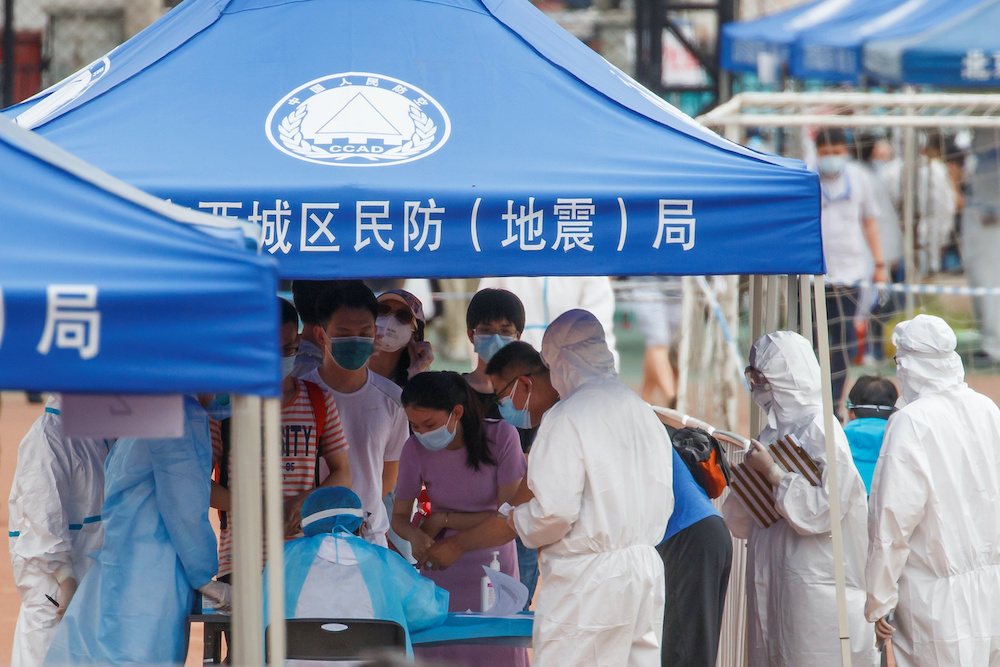Beijing Market COVID-19 Outbreak Leads To Fear Of Buying Salmon In The Country
The capital announced 34 new locally-transmitted cases linked to Xinfadi Market.
Beijing's health commission reported 36 new locally-transmitted COVID-19 cases on Monday, 15 June, after almost two months of being free from the novel coronavirus
According to CGTN, the sudden resurgence is connected to the largest wholesale market in the capital city, with 34 out of the 36 cases reported linked to Xinfadi market.
While the other two cases are still being investigated, the market was identified as the centre for the new cluster of cases after 19 workers tested positive.
The market has since been closed by officials on Saturday, 13 June.
A municipal health official said that the situation in the Chinese capital is grim as the spread of the coronavirus "has not been completely grasped".
"Beijing has entered a special time and the city's prevention and control work has entered into a war-time mode," another senior city government official told the news conference.
As of Monday, a total of 21 neighbourhoods in the capital have been put back under lockdown, with more than 90,000 residents ordered to go for COVID-19 screening
More than 8,000 staff from the Xinfadi market have also been tested and placed under quarantine and medical observation, reported CBS News.
Residential districts in Beijing have reinstated 24-hour security checkpoints to carry out temperature checks and verify citizens' health on the government's compulsory smartphone app.
Many schools have been closed entirely or left open only for graduating classes. Indoor sports and entertainment venues have also been ordered to close again.
Several Chinese cities have also urged their residents to not travel to the capital for fears of the virus spreading.
The new cluster of infections tied to Xinfadi market has given the Chinese people flashbacks to when the earliest outbreak was quickly traced to a market in Wuhan
The Guardian reported that the Xinfadi market alone supplies 80% of the city's produce, from seafood and vegetables to meat.
Chinese state media estimated that 200,000 people visited the market since 30 May.
Beijing has even fired several officials in Fengtai District, where the market is located, for the poor implementation of epidemic control measures after the outbreak was identified.
"Beijing will not turn into a second Wuhan, spreading the virus to many cities all over the country and requiring a [national] lockdown," said Zeng Guang, a government epidemiological expert, as quoted by CBS News.
The outbreak has also led to a nationwide boycott of salmon as experts investigate the source of the infection in the market
The fish has been taken off the shelves in supermarkets and grocery delivery platforms across major Chinese cities and the country has also halted all imports of salmon.
The boycott came after local health officials said that the virus was found on a chopping board used by a seller of imported salmon in Xinfadi market, which has sparked speculations on whether the fish can spread the virus.
According to CGTN, experts advised the public to not eat raw salmon until they determine the source of the coronavirus infection.
"We cannot conclude that salmon is the source of infection just because novel coronavirus was detected on a chopping board of a seller," said Wu Zunyou, chief epidemiologist at the Chinese Center for Disease Control and Prevention (CDC).
While there's a possibility that the surface of the fish could get contaminated by infected workers, fish naturally do not carry coronavirus in their bodies, unlike civets and bats, Wu explained.
Therefore, the process of purchasing and cooking faces a higher risk of transmission compared to eating cooked salmon.
To be safe, China's CDC has encouraged the public to make sure all of their food is thoroughly cooked before eating, to use different utensils for raw food, and to wash their hands after cooking and just before eating.



